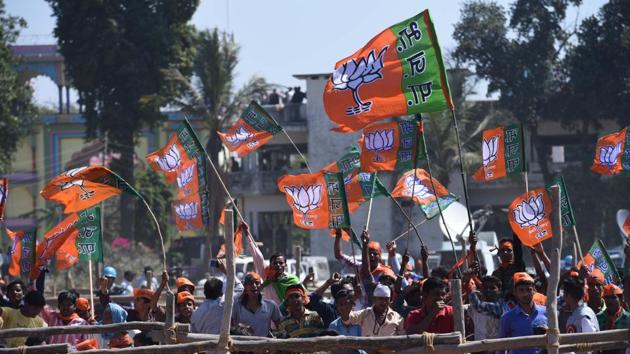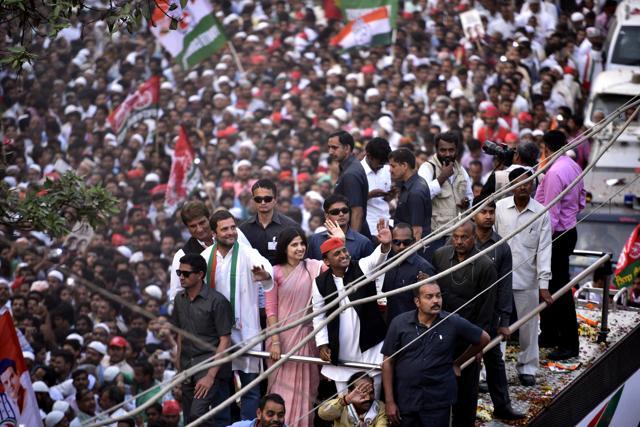UP election: How campaigning turned bitter with every phase of polling
Desperation of all major players, including the BJP, grew with every phase in the first-ever triangular contest in Uttar Pradesh.
Three road shows in a city by a prime minister are perhaps unheard of. But when it comes to poll campaigning, Narendra Modi is no traditionalist.

He took Varanasi by storm, reflecting his bonding with the holy city, his Lok Sabha constituency. But it also showed his party’s gnawing fears of losing seats.
A senior leader quipped, “We can’t afford to lose Varanasi even if we win UP.” There were many concerns, including dissension in the party, and handling them were hordes of Modi cabinet ministers.
But perhaps this was not the only reason. Desperation of all major players, including the BJP, grew with every phase in the first-ever triangular contest in the state. Rahul Gandhi and Akhilesh Yadav had Dimple Yadav joining the road show for the first time in the entire poll season.
The last two phases, with 89 seats, were important for the BJP, SP-Congress alliance and BSP to reach the magic figure of 203 in a Vidhan Sabha of 403.
Call it the demonetisation effect, the campaigning remained a low-key affair till it touched the third phase of elections. Thereafter, with every phase the tone grew shriller as campaigning reached its crescendo by the time it reached the last two phases that covered prime constituencies of veteran leaders like Narendra Modi and Mulayam Singh Yadav. Mayawati, too, has gambled by shaking hands with Qaumi Ekta Dal of incarcerated mafioso Mukhtar Ansari to pick a couple of seats here.
Electioneering, in fact, started on a sombre note with the lead campaigners focusing on development and corruption as their main poll plank. Though the communal zone of the state was covered by the first two phases, the poll speeches were not laced with communal overtones. The Prime Minister had best described the opponents as SCAM (SP, Congress, Akhilesh and Mayawati), accusing them of corruption. Akhilesh and Rahul took him on majorly on demonetisation. It could be because the BJP had already deployed Mahant Adityanath and other leaders in saffron robes to polarise the area on communal lines.
Click here for full coverage on assembly elections 2017
However, by the time the political parties entered the third phase, tempers started rising. Prime Minister’s comment, ‘Kabristan and Shamshan’ and ‘Diwali and Ramzan’ were clearly meant to communally divide the polity.
His party’s national president Amit Shah soon joined him with his ‘Kasab’ definition of three opponent parties. Akhilesh and Mayawati also retaliated sharply and then came in the ‘donkeys from Gujarat’ quip.

Political analyst Vipul Mudgal explained, “After the first two rounds of voting, the political parties must have assessed their strengths and realised they were very much in the race and needed that last push to turn the polls in their favour.”
“Prime Minister hardly takes time in getting into an intense campaign mode, while BJP got down to galvanising the cadre,” Mudgal added.
It was also because Poorvanchal was not BJP’s strong area and increased tally was vital to their dream to end their 14-year long ‘vanvas’ and form the government. It had strategically tied up with smaller parties in the East and had also penetrated the lower OBC vote bank. On the other hand both Congress and SP, who had done fairly well in 2012 in the region, struggled to retain their seats as poll partners.
Significantly, by the time campaigning came to the sixth phase all the political party’s started making emotional pitch to their hardcore caste-based vote banks for a clear majority.
Almost all leaders claimed, “We are winning this election and now need your support to form a strong and stable government.” The voters reacted with aplomb.
Now the horses are back in their stables. The safely guarded EVMs are waiting to be opened on March 11. Till then it’s time to relax, after the high drama, for the lead campaigners. Lull prevails before the storm.





